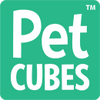Shopping Cart ( )
Your cart is currently empty.

In the realm of pet nutrition, the rise of vegan diets for dogs mirrors a growing human trend towards plant-based eating, driven by health, environmental, and ethical considerations. For dog owners contemplating a shift from traditional meat-based diets, the market offers various solutions, including conventional kibbles and canned foods, as well as innovative alternatives like PetCubes' Vegan Formula. This article explores the landscape of vegan dog diets, comparing standard market offerings to PetCubes' fresh approach, underpinned by scientific research and nutritional adequacy.
Understanding Vegan Dog Diets
Vegan diets for dogs exclude all animal products, relying instead on plant-based sources for nutrition. While dogs have evolved from largely meat-eating animals to beings capable of digesting and thriving on a more varied diet, the transition to a completely vegan regimen necessitates careful consideration to meet all nutritional needs.
Market Available Vegan Kibbles and Canned Foods
The market for vegan dog food has expanded, with kibbles and canned foods becoming increasingly available. These products are formulated to meet the nutritional standards set by pet food regulatory bodies, such as the Association of American Feed Control Officials (AAFCO) in the United States. They often include ingredients like soy, peas, lentils, and quinoa to provide protein, alongside added vitamins and minerals to ensure a balanced diet.
Pros:
Convenience: Pre-packaged and easy to store, these foods offer a straightforward feeding option.
Complete Nutrition: Formulated to be nutritionally complete, these products are fortified with essential nutrients dogs might miss on a vegan diet. Independent studies validated majority of these diets are complete and balanced.
Cons:
Processed Ingredients: Many vegan kibbles and canned foods are highly processed, which can concern pet owners seeking whole-food-based diets for their pets.
Palatability: Some dogs may find these products less appealing compared to fresh food options.
Carbohydrate content: Most of these products are very high in carbohydrates and relatively lower in protein and fat than would be ideal.
PetCubes takes a distinct approach by offering a fresh, vegan formula for dogs. Their products are crafted from fresh, whole-food ingredients, providing a minimally processed alternative to conventional vegan dog foods.
Pros:
Whole-Food Ingredients: PetCubes emphasises fresh, human-grade, whole-food ingredients, which many pet owners prefer for their nutritional transparency and minimal processing.
Nutritional Adequacy: Like their processed counterparts, PetCubes' formulas are designed to meet all of a dog's nutritional needs, focusing on fresh, plant-based ingredients. All PetCubes’ diets exceed the AAFCO standards.
Palatability: Fresh foods can be more appealing to dogs, potentially increasing their willingness to eat a vegan diet.
Carbohydrates: The formula is lower in carbs than other vegan diets and has an ideal protein-to-fat ratio.
Cons:
Storage and Shelf Life: Fresh foods require refrigeration and have a shorter shelf life than kibbles or canned foods, which may not suit all pet owners.
Cost: The price point for fresh, high-quality ingredients can be slightly higher than that of conventional vegan kibbles and canned foods.
Scientific Studies and Nutritional Adequacy
Research into vegan diets for dogs is ongoing, but several studies have shown that dogs can thrive on well-formulated vegan diets. A key study published in the Journal of American Veterinary Medical Association (JAVMA) demonstrated that dogs fed a carefully balanced vegan diet could meet their nutritional requirements and maintain health comparable to dogs on conventional diets. However, the importance of formulating these diets to meet all of a dog's nutritional needs cannot be overstated, with particular attention to protein, amino acids, and vitamins like B12, D, and E, along with minerals such as calcium and phosphorus.
Conclusion
The choice between conventional vegan dog foods and fresh alternatives like PetCubes' Vegan Formula depends on a variety of factors, including nutritional philosophy, convenience, cost, and a dog's personal preference. While both options can provide a nutritionally adequate diet, PetCubes' commitment to fresh, whole-food ingredients offers an appealing choice for pet owners prioritising minimal processing and nutritional transparency. As with any dietary change, consulting with a Wildlife Nutritionist can ensure that a dog's switch to a vegan diet is both safe and beneficial, tailored to their individual health needs and lifestyle.
You have no items in wishlist.
| Title |
|---|
| Price |
| Add to cart |
| Type |
| Vendor |
| Title |
|---|
| Price |
| Add to cart |
| Type |
| Vendor |

